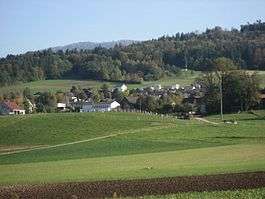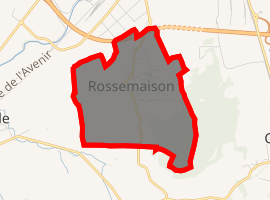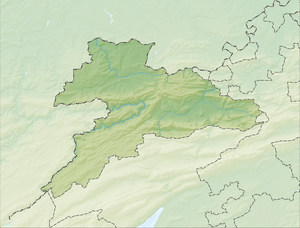Rossemaison
Rossemaison is a municipality in the district of Delémont of the canton of Jura in Switzerland.
Rossemaison | |
|---|---|
 Rossemaison village | |
 Coat of arms | |
Location of Rossemaison 
| |
 Rossemaison  Rossemaison | |
| Coordinates: 47°21′N 07°21′E | |
| Country | Switzerland |
| Canton | Jura |
| District | Delémont |
| Government | |
| • Mayor | Maire |
| Area | |
| • Total | 1.98 km2 (0.76 sq mi) |
| Elevation | 455 m (1,493 ft) |
| Population (2018-12-31)[2] | |
| • Total | 634 |
| • Density | 320/km2 (830/sq mi) |
| Postal code | 2842 |
| SFOS number | 6721 |
| Surrounded by | Courtételle, Delémont, Courrendlin, Châtillon |
| Website | http://www.rossemaison.ch SFSO statistics |
History
Rossemaison is first mentioned in 1462 as Rosemason. The municipality was formerly known by its German name Rottmund, however, that name is no longer used.[3]
Geography
Rossemaison has an area of 1.89 km2 (0.73 sq mi).[4] Of this area, 1.28 km2 (0.49 sq mi) or 67.7% is used for agricultural purposes, while 0.35 km2 (0.14 sq mi) or 18.5% is forested. Of the rest of the land, 0.31 km2 (0.12 sq mi) or 16.4% is settled (buildings or roads).[5]
Of the built up area, housing and buildings made up 13.2% and transportation infrastructure make up 1.1%. Power and water infrastructure as well as other special developed areas make up 1.6% of the area Out of the forested land, 17.5% of the total land area is heavily forested and 1.1% is covered with orchards or small clusters of trees. Of the agricultural land, 46.6% is used for growing crops and 19.6% is pastures, while 1.6% is used for orchards or vine crops.[5]
The municipality is located in the Delemont district.
The municipalities of Bourrignon, Châtillon, Courrendlin, Courtételle, Delémont, Develier, Ederswiler, Mettembert, Movelier, Pleigne, Rebeuvelier, Rossemaison and Vellerat are considering a in the future into the new municipality with, as of 2011, an undetermined name.[6]
Coat of arms
The blazon of the municipal coat of arms is Argent, on Coupeaux Vert a Horse rearing Gules.[7]
Demographics
Rossemaison has a population (as of December 2018) of 637.[8] As of 2008, 6.2% of the population are resident foreign nationals.[9] Over the last 10 years (2000–2010) the population has changed at a rate of 8.9%. Migration accounted for 3.7%, while births and deaths accounted for 4.1%.[10]
Most of the population (as of 2000) speaks French (468 or 93.4%) as their first language, German is the second most common (20 or 4.0%) and Italian is the third (11 or 2.2%).[11]
As of 2008, the population was 52.1% male and 47.9% female. The population was made up of 275 Swiss men (49.1% of the population) and 17 (3.0%) non-Swiss men. There were 254 Swiss women (45.4%) and 14 (2.5%) non-Swiss women.[12] Of the population in the municipality, 170 or about 33.9% were born in Rossemaison and lived there in 2000. There were 188 or 37.5% who were born in the same canton, while 79 or 15.8% were born somewhere else in Switzerland, and 52 or 10.4% were born outside of Switzerland.[11]
As of 2000, children and teenagers (0–19 years old) make up 25.7% of the population, while adults (20–64 years old) make up 61.3% and seniors (over 64 years old) make up 13%.[10]
As of 2000, there were 204 people who were single and never married in the municipality. There were 255 married individuals, 27 widows or widowers and 15 individuals who are divorced.[11]
As of 2000, there were 180 private households in the municipality, and an average of 2.8 persons per household.[10] There were 27 households that consist of only one person and 21 households with five or more people. In 2000, a total of 176 apartments (91.2% of the total) were permanently occupied, while 12 apartments (6.2%) were seasonally occupied and 5 apartments (2.6%) were empty.[13] The vacancy rate for the municipality, in 2010, was 0.84%.[10]
The historical population is given in the following chart:[3][14]

Politics
In the 2007 federal election the most popular party was the SPS which received 43.07% of the vote. The next three most popular parties were the SVP (21.16%), the FDP (18.39%) and the CVP (11.34%). In the federal election, a total of 202 votes were cast, and the voter turnout was 47.9%.[15]
Economy
As of 2010, Rossemaison had an unemployment rate of 3.2%. As of 2008, there were 23 people employed in the primary economic sector and about 8 businesses involved in this sector. 52 people were employed in the secondary sector and there were 6 businesses in this sector. 58 people were employed in the tertiary sector, with 15 businesses in this sector.[10] There were 252 residents of the municipality who were employed in some capacity, of which females made up 40.9% of the workforce.
In 2008 the total number of full-time equivalent jobs was 116. The number of jobs in the primary sector was 18, all of which were in agriculture. The number of jobs in the secondary sector was 48 of which 14 or (29.2%) were in manufacturing and 34 (70.8%) were in construction. The number of jobs in the tertiary sector was 50. In the tertiary sector; 23 or 46.0% were in wholesale or retail sales or the repair of motor vehicles, 2 or 4.0% were in the movement and storage of goods, 1 was in a hotel or restaurant, 17 or 34.0% were technical professionals or scientists, 4 or 8.0% were in education.[16]
In 2000, there were 76 workers who commuted into the municipality and 196 workers who commuted away. The municipality is a net exporter of workers, with about 2.6 workers leaving the municipality for every one entering. About 5.3% of the workforce coming into Rossemaison are coming from outside Switzerland.[17] Of the working population, 9.5% used public transportation to get to work, and 70.2% used a private car.[10]
Religion
From the 2000 census, 387 or 77.2% were Roman Catholic, while 65 or 13.0% belonged to the Swiss Reformed Church. Of the rest of the population, there was 1 individual who belongs to the Christian Catholic Church, and there were 18 individuals (or about 3.59% of the population) who belonged to another Christian church. There were 5 (or about 1.00% of the population) who were Islamic. 19 (or about 3.79% of the population) belonged to no church, are agnostic or atheist, and 15 individuals (or about 2.99% of the population) did not answer the question.[11]
Education
In Rossemaison about 202 or (40.3%) of the population have completed non-mandatory upper secondary education, and 57 or (11.4%) have completed additional higher education (either university or a Fachhochschule). Of the 57 who completed tertiary schooling, 64.9% were Swiss men, 33.3% were Swiss women.[11]
The Canton of Jura school system provides two year of non-obligatory Kindergarten, followed by six years of Primary school. This is followed by three years of obligatory lower Secondary school where the students are separated according to ability and aptitude. Following the lower Secondary students may attend a three or four year optional upper Secondary school followed by some form of Tertiary school or they may enter an apprenticeship.[18]
During the 2009-10 school year, there were a total of 55 students attending 4 classes in Rossemaison. There was one kindergarten class with a total of 14 students in the municipality.[19] The municipality had 3 primary classes and 41 students.[20] There are only nine Secondary schools in the canton, so all the students from Rossemaison attend their secondary school in another municipality.
As of 2000, there were 4 students in Rossemaison who came from another municipality, while 44 residents attended schools outside the municipality.[17]
References
- "Arealstatistik Standard - Gemeinden nach 4 Hauptbereichen". Federal Statistical Office. Retrieved 13 January 2019.
- "Ständige Wohnbevölkerung nach Staatsangehörigkeitskategorie Geschlecht und Gemeinde; Provisorische Jahresergebnisse; 2018". Federal Statistical Office. 9 April 2019. Retrieved 11 April 2019.
- Rossemaison in German, French and Italian in the online Historical Dictionary of Switzerland.
- Arealstatistik Standard - Gemeindedaten nach 4 Hauptbereichen
- Swiss Federal Statistical Office-Land Use Statistics 2009 data (in German) accessed 25 March 2010
- Amtliches Gemeindeverzeichnis der Schweiz published by the Swiss Federal Statistical Office (in German) accessed 21 December 2011
- Flags of the World.com accessed 22-December-2011
- Swiss Federal Statistical Office - STAT-TAB, online database – Ständige und nichtständige Wohnbevölkerung nach institutionellen Gliederungen, Geburtsort und Staatsangehörigkeit (in German) accessed 23 September 2019
- Swiss Federal Statistical Office - Superweb database - Gemeinde Statistics 1981-2008 (in German) accessed 19 June 2010
- Swiss Federal Statistical Office accessed 22-December-2011
- STAT-TAB Datenwürfel für Thema 40.3 - 2000 Archived 2014-04-09 at the Wayback Machine (in German) accessed 2 February 2011
- Canton Jura Statistics- Population résidante permanente au 1er janvier 2010, canton du Jura et communes Archived 2012-04-26 at the Wayback Machine (in French) accessed 2 March 2011
- Swiss Federal Statistical Office STAT-TAB - Datenwürfel für Thema 09.2 - Gebäude und Wohnungen Archived 2014-09-07 at the Wayback Machine (in German) accessed 28 January 2011
- Swiss Federal Statistical Office STAT-TAB Bevölkerungsentwicklung nach Region, 1850-2000 Archived 2014-09-30 at the Wayback Machine (in German) accessed 29 January 2011
- Swiss Federal Statistical Office, Nationalratswahlen 2007: Stärke der Parteien und Wahlbeteiligung, nach Gemeinden/Bezirk/Canton (in German) accessed 28 May 2010
- Swiss Federal Statistical Office STAT-TAB Betriebszählung: Arbeitsstätten nach Gemeinde und NOGA 2008 (Abschnitte), Sektoren 1-3 Archived 2014-12-25 at the Wayback Machine (in German) accessed 28 January 2011
- Swiss Federal Statistical Office - Statweb Archived 2012-08-04 at Archive.today (in German) accessed 24 June 2010
- EDK/CDIP/IDES (2010). Kantonale Schulstrukturen in der Schweiz und im Fürstentum Liechtenstein / Structures Scolaires Cantonales en Suisse et Dans la Principauté du Liechtenstein (PDF) (Report). Retrieved 24 June 2010.
- Effectifs de l'école enfantine 2009-2010 Archived 2012-04-14 at the Wayback Machine (in French) accessed 19 December 2011
- Effectifs de l'école primaire (in French) accessed 19 December 2011